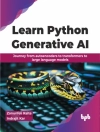This book offers the latest research results on blockchain technology and its application for cybersecurity in cyber-physical systems (CPS). It presents crucial issues in this field and provides a sample of recent advances and insights into the research progress. Practical use of blockchain technology is addressed as well as cybersecurity and cyber threat challenges and issues. This book also offers readers an excellent foundation on the fundamental concepts and principles of blockchain based cybersecurity for cyber-physical systems. It guides the reader through the core ideas with expert ease.
Blockchain technology has infiltrated all areas of our lives, from manufacturing to healthcare and beyond. Cybersecurity is an industry that has been significantly affected by this technology, and maybe more so in the future. This book covers various case studies and applications of blockchain in various cyber-physical fields, such as smart cities, Io T, healthcare, manufacturing, onlinefraud, etc.
This book is one of the first reference books covering the application of blockchain technology for cybersecurity in cyber-physical systems (CPS). Researchers working in the cybersecurity field and advanced-level students studying this field will find this book useful as a reference. Decision-makers, managers and professionals also working in this field will want to purchase this book.
Cuprins
Chapter. 1. Cryptocurrency wallets: assessment and security.- Chapter. 2. Cyber-Physical Systems Security: Analysis, Opportunities, Challenges, and Future Prospects.- Chapter. 3. Cybersecurity-based Blockchain for Cyber-physical Systems: Challenges and Applications.- Chapter. 4. Trust Management in Cyber-Physical System: Issues and Challenges.- Chapter. 5. Blockchain-Based Authentication in Io T Environments: A Survey.- Chapter. 6. Blockchain Technology-Based Smart Cities: A Privacy-Preservation Review.- Chapter. 7. Security in Electronic Health Records System: Blockchain-Based Framework to Protect Data Integrity.- Chapter. 8. A Secure Data-sharing Framework Based on Blockchain: Teleconsultation Use-case.- Chapter. 9. Reputation-Based Consensus on a Secure Blockchain Network.- Chapter. 10. AI and Blockchain for cybersecurity in Cyber- Physical Systems: Challenges and Future Research Agenda.- Chapter. 11. Assessing the Predictability of Bitcoin Using AI and Statistical Models.- Chapter. 12. Blockchain-based novel solution for Online fraud prevention and detection.- Chapter. 13. Proactive AI Enhanced Consensus Algorithm with Fraud Detection in Blockchain.
Despre autor
Prof. Yassine Maleh is an Associate Professor at the National School of Applied Sciences at Sultan Moulay Slimane University, Morocco. He received his Ph.D. degree in Computer Science from Hassan 1st University, Morocco, since 2017. He is a cybersecurity and Information Technology researcher and practitioner with industry and academic experience. He worked for the National Ports Agency in Morocco as an IT manager from 2012 to 2019. He is a Senior Member of IEEE, Member of the International Association of Engineers IAENG and The Machine Intelligence Research Labs. Dr Maleh has made contributions to information security and privacy, Internet of Things Security, Wireless and Constrained Networks Security. His research interests include Information Security and Privacy, Internet of Things, Networks Security, Information systems and IT Governance. He has published over 140 papers (Book chapters, international journals and conferences/workshops), 20 edited books and 4 authored books. He is the editor-in-chief of the
International Journal of Information Security and Privacy, and the
International Journal of Smart Security Technologies (IJSST). He serves as an associate editor for IEEE Access (2019 Impact Factor 4.098), the
International Journal of Digital Crime and Forensics (IJDCF), and the
International Journal of Information Security and Privacy (IJISP). He is a series editor of Advances in Cybersecurity Management, by CRC Taylor & Francis. He was also a guest editor for many special issues in reputed journals (IEEE, Springer, Elsevier, …). He has served and continues to serve on executive and technical program committees and as a reviewer of numerous international conferences and journals such as Elsevier Ad Hoc Networks, IEEE Network Magazine, IEEE Sensor Journal, ICT Express, and Springer Cluster Computing. He was the Publicity chair of BCCA 2019 and the General Chair of the MLBDACP 19 symposium and ICI2C’21 Conference. He received Publons Top 1% reviewer award for the years 2018 and 2019.
Prof. Mamoun Alazab is the Associate Professor in the College of Engineering, IT and Environment at Charles Darwin University, Australia. He received his Ph D degree is in Computer Science from the Federation University of Australia, School of Science, Information Technology and Engineering. He is a cybersecurity researcher and practitioner with industry and academic experience. Dr Alazab’s research is multidisciplinary that focuses on cybersecurity and digital forensics of computer systems including current and emerging issues in the cyber environment like cyber-physical systems and the internet of things, by considering the unique challenges present in these environments, with a focus on cybercrime detection and prevention. He looks into the intersection of machine learning as an essential tool for cybersecurity, for example, for detecting attacks, analyzing malicious code or uncovering vulnerabilities in software. He has more than 100 research papers. He is the recipient of a short fellowship from Japan Society for the Promotion of Science (JSPS) based on his nomination from the Australian Academy of Science. He delivered many invited and keynote speeches, 27 events in 2019 alone. He convened and chaired more than 50 conferences and workshops. He is the founding chair of the IEEE Northern Territory Subsection: (Feb 2019 – current). He is a Senior Member of the IEEE, Cybersecurity Academic Ambassador for Oman’s Information Technology Authority (ITA), Member of the IEEE Computer Society’s Technical Committee on Security and Privacy (TCSP). He has worked closely with government and industry on many projects, including IBM, Trend Micro, the Australian Federal Police (AFP), the Australian Communications and Media Authority (ACMA), Westpac, UNODC, and the Attorney General’s Department.
Prof.Imed Romdhani is a full-time Associate Professor in networking at Edinburgh Napier University since June 2005. He was awarded his Ph D from the University of Technology of Compiegne (UTC), France in May 2005. He also holds engineering and a Master degree in networking obtained respectively in 1998 and 2001 from the National School of Computing (ENSI, Tunisia) and Louis Pasteur University (ULP, France). He worked extensively with Motorola Research Labs in Paris and authored 4 patents.












